- Home
- Iris Murdoch
A Severed Head Page 2
A Severed Head Read online
Page 2
Two
In almost every marriage there is a selfish and an unselfish partner. A pattern is set up and soon becomes inflexible, of one person always making the demands and one person always giving way. In my own marriage I early established myself as the one who took rather than gave. Like Dr Johnson, I started promptly upon the way in which I intended to go on. I was the more zealous in doing so in that I was counted by the world, and counted myself, very lucky to have got Antonia.
I had, of course, misled Georgie about the success of my marriage. What married man who keeps a mistress does not so mislead her? My marriage with Antonia, apart from the fad. which was a continuing grief to me, that it was childless, was perfectly happy and successful. It was just that I wanted Georgie as well and did not see why I should not have her. Although, as 1 had remarked, I was not indifferent to the ‘rules’, I was certainly capable of being cool and rational about adultery. I had married Antonia in a church, but that was largely for social reasons; and I did not think that the marriage bond, though solemn, was uniquely sacred. It may be relevant here to add that I hold no religious beliefs whatever. Roughly, I cannot imagine any omnipotent sentient being sufficiently cruel to create the world we inhabit.
I seem to have started here upon some general explanation of myself, and it may be as well to continue this before I plunge into a narrative of events which may, once under way, offer few opportunities for meditation. My name, as you will have gathered, is Martin Lynch-Gibbon, and I come on my father’s side of an Anglo-Irish family. My clever artistic mother was Welsh. I have never lived in Ireland, though I retain a sentimental sense of connexion with that poor bitch of a country. My brother Alexander is forty-five, and my sister Rosemary is thirty-seven: my age is forty-one, and I feel myself at times, after a manner which is not without its curious melancholy charms, to be an old man.
To describe one’s character is difficult and not necessarily illuminating. The story which follows will reveal, whether I will or no, what sort of person I am. Let me offer here only a few elementary facts. I grew up into the war, during which I spent on the whole a safe and inactive time. I suffer intermittenly from a complex of disorders of which asthma and hay fever are the best known, though not the most disagreeable, and I never succeeded in passing as completely fit. I went on to Oxford when the war was over, and so began my life as an ordinary citizen at a comparatively advanced age. I am a very tall, reasonably good-looking man. I used to be a good boxer, and passed when I was younger as a raffish quarrelsome violent fellow. This reputation was precious to me: equally precious is the reputation which I have more lately gained of having become morose, something of a recluse, something indeed of a philosopher and cynic, one who expects little and watches the world go by. Antonia accuses me of being flippant; but Georgie once pleased me more by saying that I had the face of someone laughing at something tragic. My face, I might add, is the long pale rather heavy old-fashioned face that all the Lynch-Gibbons have, which is a cross between the philosopher Hume and the actor Garrick, and my hair is the brown floppy hair which fades with age to the colour of white pepper. Our family, thank God, never becomes bald.
I took a decisive step when I married Antonia. I was then thirty, and she was thirty-five. She looks now, for all her beauty, a little older than her years, and has more than once been taken for my mother. My real mother, who among other things was a painter, died when I was sixteen, but at the time of my marriage my father was still alive and I had hitherto been but casually involved in the wine trade. I was more concerned, though that also in a dilettante fashion, with being a military historian, a type of study in which, if I could have brought myself to abandon my amateur status, I might have excelled. When I married Antonia, however, everything came, for some time, to a standstill. As I say, I was fortunate to get her. Antonia had been, and indeed still was, a somewhat eccentric society beauty. Her father was a distinguished regular soldier, and her mother, who came out of the Bloomsbury world, was something of a minor poet and a remote relation of Virginia Woolf. For some reason Antonia never got a sensible education, though she lived abroad a great deal and speaks three languages fluently; and also, for some reason, and although much courted, she did not marry young. She moved in a fashionable society, more fashionable than that which I frequented, and became, through her protracted refusal to marry, one of its scandals. Her marriage to me, when it came, was a sensation.
I was not sure at the time, and am still not sure, whether I was precisely what Antonia wanted, or whether she didn’t take me simply because she felt it was time to take somebody. However that may be, we were formidably happy; and for quite a long time, handsome clever couple that we were, we were everyone’s darlings. So for a while everything was for me at a standstill and I was absorbed completely into the delightful task of being Antonia’s husband. When I as it were came round, emerged, that is, from the warm golden haze of those honeymoon years, I found that certain roads were closed to me. My father had died meanwhile, and I settled down to being a wine-merchant, still and even here feeling myself something of an amateur and none the worse for that; and although my conception of myself had somewhat altered, I did not stop feeling happy. After all, as Antonia’s husband I could not be other than happy.
Let me now attempt to describe Antonia. She is a woman long accustomed to admiration, long accustomed to think of herself as beautiful. She has long goldenish hair - I prefer women with long hair - which she wears usually in an old-fashioned knot or bun, and indeed ‘golden’ is the best general epithet for her appearance. She is like some rich gilded object over which time has cast the moonlit pallor of a gentle veneer; or in a more effective simile one might compare her to the water-haunted sunlight on an old pavement in Venice, for there is always something a little fluid and shivering, a little mobile and tremulous about Antonia. She has, especially of late, aged, her face taking on that look which is sometimes described as ‘ravaged’ and which I notice is usually applied when, as in this case, there is a slight drooping and discomposing of essentially fine features. To my mind such a look can be, and is in the case of Antonia, exceedingly moving and attractive, composing a dignity which was not to be found in the same face when younger. Antonia has great tawny-coloured intelligent searching eyes and a mobile expressive mouth which is usually twisted into some pout of amusement or tender interest. She is a tall woman, and although always a little inclined to plumpness has been called ‘willowy’, which I take as a reference to her characteristic twisted and unsymmetrical poses. Her face and body are never to be discovered quite in repose.
Antonia has a sharp appetite for personal relations. She is an intense and passionate woman and has passed for this reason for being humourless, though this latter charge in fact is false. Antonia, like me, has no religion; but she achieves what might be called religiosity in relation to certain beliefs. She holds that all human beings should aspire towards, and are within working distance of, a perfect communion of souls. This creed, which borrows as little from popular Oriental cults as it does from Antonia’s vestigial Christianity, may best be described as a metaphysic of the drawing-room. In the form in which Antonia holds it, it is original to her, although I can discern its statelier predecessor in Antonia’s now frail but resolutely exquisite mother with whom I have maintained a tenuous but gallant relationship. Antonia’s undogmatic apprehension of an imminent spiritual interlocking where nothing is withheld and nothing hidden certainly makes up in zeal for what it lacks in clarity. The mere presence of such a belief in a woman, particularly in a beautiful woman, tends of course to create a rich centripetal eddy of emotion round about her, thereby providing itself with an immediate pragmatic verification; and in the early days particularly people were always falling in love with Antonia and wanting to tell her all their troubles. I had no objection to this, as it eased some of my anxieties about her welfare by making her happier than if she had had no soul to commune with but my own.
Of late she had been much taken
up with Palmer Anderson, ‘Anderson’ as she always called him, since she had a mystique about persons whose names, like her own, began with A. This mystique had been active also in relation to my brother Alexander, between whom and my wife there existed a very considerable, almost sentimental, tenderness, though this had been less evident of late since Anderson had become all the rage. I cannot think of anyone less in need of psycho-analysis than Antonia, and I think she went into analysis with Palmer at least partly with the idea of operating on him. I once said sarcastically that I didn’t see why I should pay out so many guineas per week so that Antonia should question Palmer about his childhood, and she laughed merrily and did not deny the insinuation. Also, of course, psycho-analysis was for her a ‘craze’ like earlier ones that she had had for learning contract bridge, learning Russian, learning to sculpt (with Alexander), doing social work, (with Rosemary), and studying Italian Renaissance history (with me). I should add that whatever Antonia took up she proved surprisingly good at, and I had no doubt that she and Palmer were getting on famously.
A word about Palmer is necessary; and this I find difficult. The pages that follow will show how and why my feelings on the subject of Palmer are mixed ones. I shall only try now to describe him as I saw him at the start, before I knew certain crucial facts about him, and when I was still more than a little ‘carried away’. Palmer strikes one immediately as an American, though he is in fact only half American and grew up in Europe. He has that tall lanky, ‘rangy’ loose-jointed graceful close-cropped formidably clean American look. He has silver-grey hair which grows soft, furry, and inch-long all over his very round rather smallish head, and a smooth face which looks uncannily younger than his years. It is hard to believe he is over fifty. He dresses in the American style with belts instead of braces and so on, and affects many foppish and casual rig-outs, involving bright silk handkerchiefs instead of ties. I can never indeed see a gay clean silk handkerchief without thinking of Palmer; there is something about this object which is singularly reminiscent of him. Palmer conveys an immediate impression of gentleness and sweetness and almost, so far have good manners here assumed the air of a major virtue, of goodness. He is also a beautifully cultivated person. It was I, not Antonia, who ‘discovered’ Palmer, and for a long time, before she took him over, I saw a good deal of him. We used to read Dante together; and his relaxed gaiety, his unshadowed enjoyment of his pleasures, eased and complemented, though without dispelling, my affection of a resigned melancholy. Palmer appeared, in my generously admiring vision of him, as a complete and successful human being. He had come to analysis fairly late, after practising for some time, both in America and in Japan, as an ordinary doctor, and he had achieved a considerable reputation as that fashionable kind of modern magician. He spent half the week in Cambridge, where he lodged with his sister and lent his ear to neurotic undergraduates, and the other half in London, where he seemed to have a formidable number of well-known patients. He worked hard; and as I saw him, he was and deserved to be a being of an exceptional felicity.
I had known Palmer, when this story starts, for nearly four years. I had known Georgie Hands for three years, and she had been my mistress for eighteen months. Georgie, who is now twenty-six, had been an undergraduate at Cambridge, where she had taken a degree in economics. She had then become a graduate student, and more lately a junior lecturer, at the London School of Economics. I had met her, in her early days in London, when I had visited the School once to give a lecture on Machiavelli’s account of the campaigns of Cesare Borgia to a student society, and we had met subsequently a few times, had lunch together, and even exchanged some friendly consoling kisses, without anything remarkable occurring in the heart of either. I had never hitherto deceived my wife, and imagined that I had no possible intention of doing so; and it was pure accident that I never introduced Georgie to Antonia in those early and innocent days. Georgie was living then in a hostel for women students, a dreary place which I never attempted to visit. Then she moved into her little flat; and I promptly fell in love with her. It may sound ludicrous, but I think I fell in love with her as soon as I saw her bed.
I did not fall desperately in love with Georgie; I considered myself by then too old for the desperation and extremity which attends a youthful love. But I loved her with a sort of gaiety and insouciance which was more spring-like than real spring, a miraculous April without its pangs of transformation and birth. I loved her with a wild undignified joy, and also with a certain cheerful brutality, both of which were absent from my always more decorous, my essentially sweeter relationship with Antonia. I adored Georgie too for her dryness, her toughness, her independence, her lack of intensity, her wit, and altogether for her being such a contrast, such a complement, to the softer and more moist attractions, the more dewy radiance of my lovely wife. I needed both of them, and having both I possessed the world.
If the extent to which Antonia was inside society was important to me, the extent also mattered to which Georgie was outside it. That I could love such a person was a revelation and education to me and something of a triumph: it involved a rediscovery of myself. Georgie’s lack of pretension was good for me. Whereas in different ways both Rosemary and Antonia were perpetually playing the role of being a woman, Georgie played no role: and this was new to me. She was herself, which just happened to involve, and nature had decreed superbly, being a woman. She was concerned neither with role nor with status, and it was with exhilaration that at times I positively apprehended her as an outcast.
This sense of being, with Georgie, ‘on the run’ had suffered a certain change after Georgie’s pregnancy. Whereas our lawless existence before that had seemed gay and even innocent, it was after that connected with a certain pain which remained identifiable among all others, not extreme but persistent. We had lost our innocence, and some remaking of our relationship which was then due was continually deferred, as a result partly of my pusillanimity and partly of Georgie’s taciturn endurance. I had at the time of the child made a number of extravagant remarks about wishing to join my lot more completely with hers. These remarks had had no sequel, but they remained between us as a text which must some day be revised, ratified, or at least explained. Meanwhile, it was important to me, even very important, that Antonia should think me virtuous; and, with that degree of self-deception which is essential to a prolonged and successful masquerade, I even felt virtuous.
Three
I was lying on the big sofa at Hereford Square reading Napier’s History of the Peninsular War and wondering whether Georgie’s incense was going to give me asthma. A bright fire of coal and wood was glowing and murmuring in the grate, and intermittent lamps lit with a soft gold the long room which, even in winter, by some magic of Antonia’s, contrived to smell of roses. A large number of expensive Christmas cards were arrayed on the piano; while upon the walls dark evergreens, tied into various clever sprays and joined together by long dropping swags of red and silver ribbon, further proclaimed the season. Antonia’s decorations combined a traditional gaiety with the restrained felicity which marked all her domestic arrangements.
I had just come back from Georgie’s and was still alone. I had lied to Georgie about the time of Antonia’s return - her session with Palmer was not due to end until six - so as to have an interval of quiet before the storm of excited chatter which would undoubtedly follow. Antonia always arrived back from Palmer’s house in a state of restless elation. I had supposed, and one is often complacently led to believe by persons undergoing such treatment, that a psycho-analysis is a grim and humiliating affair; but in the case of my wife, analysis seemed to produce euphoria and even self-satisfaction. At peace with the world and with myself I breathed the quiet air, lying relaxed and warm in the bright multi-coloured shell which Antonia and I had created, where silk and silver and rosewood, dark mahogany and muted gilt blended sweetly together against a background of Bellini green. I sipped the frosted fragrant Martini which I had just prepared for both of us and thought m
yself, I dare say, the luckiest of men. Indeed at that moment I was happy with an idle thoughtless happiness which was never to come, with that particular quality of a degenerate innocence, ever in my life again.
I was just looking at my watch, wondering whether she was late, when Antonia appeared in the doorway. Usually when she entered she took possession of a room, gliding immediately to the centre of it, and even, with people she knew well, turning about as if to fill all the crannies and corners with her presence. But tonight, already so marked as unusual, she stayed at the door, as if afraid to enter, or as if conscious of her entrance as dramatic. There she stood wide-eyed, her hand upon the door handle, staring at me in a disconcerting way. I noticed too that she had not changed her clothes, but was still wearing the striped silk blouse and cinnamon-coloured skirt which she had had on in the morning. Normally Antonia put on different clothes three or four times in a day.
‘You haven’t changed, my love,’ I said, sitting up. I was still in the slow old world. ‘What is it? You look a bit bothered. Come and have your drink and tell me all about it.’ I laid Napier aside.
Antonia came in now, moving in a slow deliberate heavy-footed way and keeping her eyes fixed on me. I wondered if she had seen something which I had missed in the evening papers, some account of a distant cataclysm, or of some accident to an acquaintance, either of which might be announced to me with a certain portentous interest. She sat down at the far end of the sofa, still watching me with a tense unsmiling look. I tinkled the long glass rod in the cocktail jug and poured her out a Martini. ‘What is it, darling? Has there been an earthquake in China or have you been arrested for speeding?’

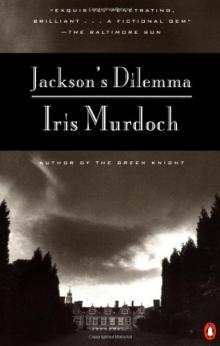 Jackson's Dilemma
Jackson's Dilemma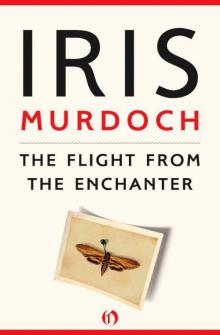 The Flight From the Enchanter
The Flight From the Enchanter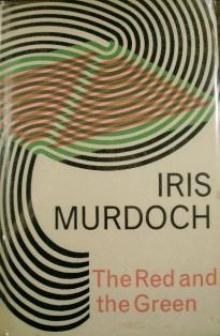 The Red and the Green (Vintage Classics)
The Red and the Green (Vintage Classics)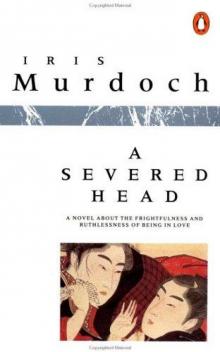 A Severed Head
A Severed Head The Black Prince
The Black Prince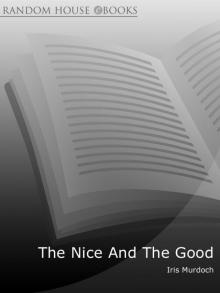 The Nice and the Good
The Nice and the Good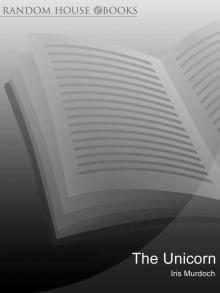 The Unicorn
The Unicorn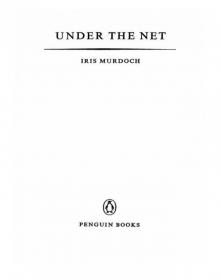 Under the Net
Under the Net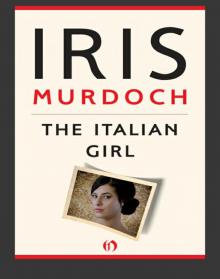 The Italian Girl
The Italian Girl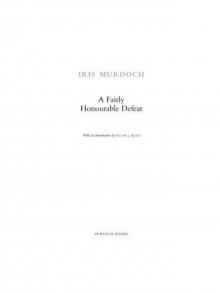 A Fairly Honourable Defeat
A Fairly Honourable Defeat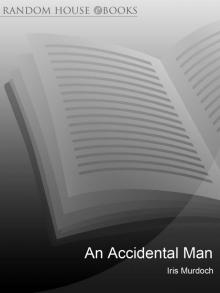 An Accidental Man
An Accidental Man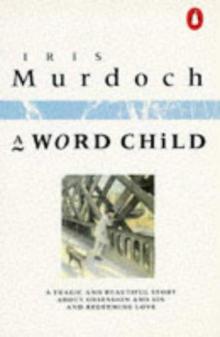 A Word Child
A Word Child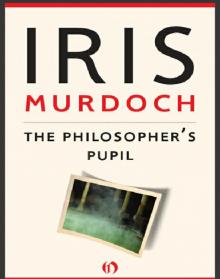 The Philosopher's Pupil
The Philosopher's Pupil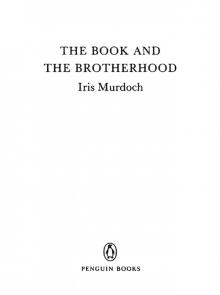 The Book and the Brotherhood
The Book and the Brotherhood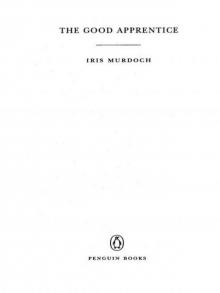 The Good Apprentice
The Good Apprentice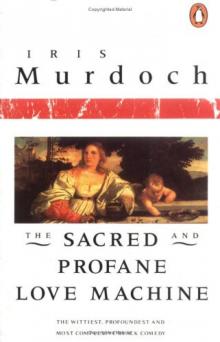 The Sacred and Profane Love Machine
The Sacred and Profane Love Machine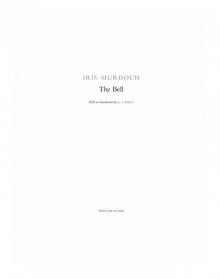 The Bell
The Bell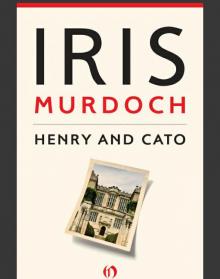 Henry and Cato
Henry and Cato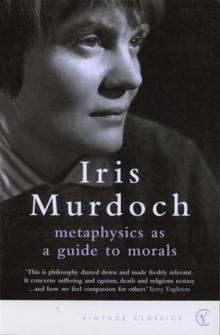 Metaphysics as a Guide to Morals
Metaphysics as a Guide to Morals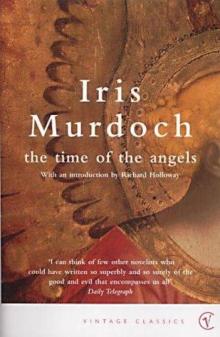 The Time of the Angels
The Time of the Angels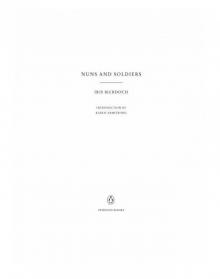 Nuns and Soldiers
Nuns and Soldiers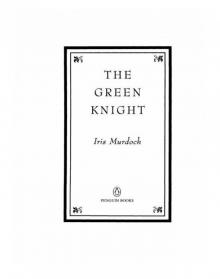 The Green Knight
The Green Knight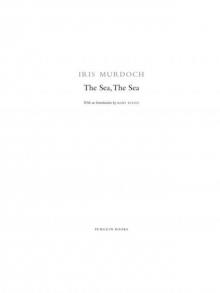 The Sea, the Sea
The Sea, the Sea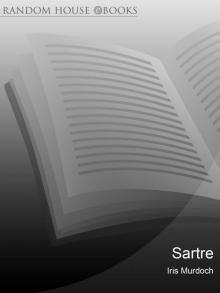 Sartre: Romantic Rationalist
Sartre: Romantic Rationalist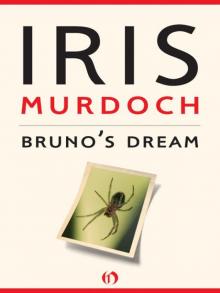 Bruno's Dream
Bruno's Dream An Unofficial rose
An Unofficial rose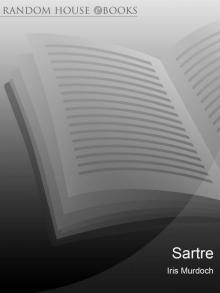 Sartre
Sartre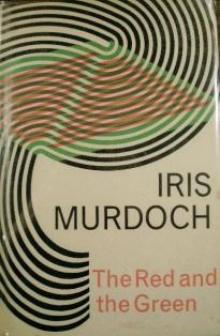 The Red and The Green
The Red and The Green